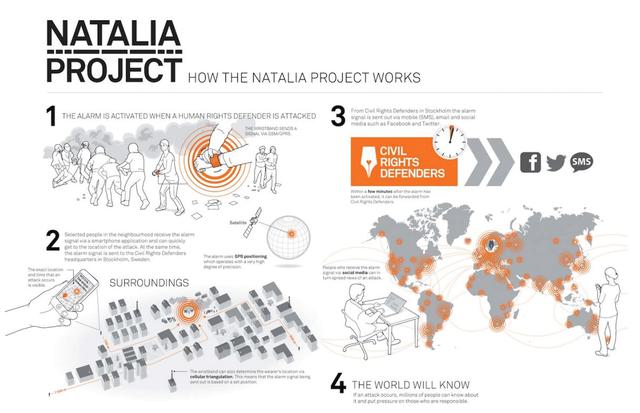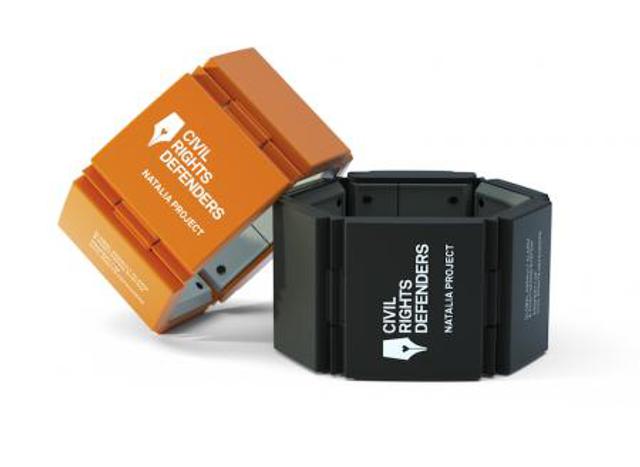Civil Rights Defenders: the Natalia Project, the first assault alarm to protect defenders of human rights
- Exhibited by
- SOFII
- Added
- February 12, 2014
- Medium of Communication
- Online.
- Target Audience
- Individuals.
- Type of Charity
- Human rights & civil liberties.
- Country of Origin
- Sweden.
- Date of first appearance
- April, 2013.
SOFII’s view
These alarms that could save the lives of those brave people who fight so hard to protect the rights of people living under the threat of oppression are marvellous in themselves and donors could do nothing but react favourably to them. That they know when an alarm is activated and are kept informed as the situation develops is a stroke of genius on behalf of Civil Rights Defenders. They are also making excellent use of socal media by encouraging their donors to spread the word amongst their contacts. That is involvement that their donors obviously love.
Summary / objectives
Everyday, people all over the world risk their lives defending rights most people in the western world take for granted. The Natalia Project was founded to protect these heroes. The Project is a personal alarm for human rights defenders named after Natalia Estemirova who was abducted and murdered in 2009.
Creator / originator
Civil Rights Defenders.
Background
On the morning of 15 July, 2009 Natalia Estemirova, human rights defender, was abducted in Chechnya. That evening she was found dead in the woods: she had been murdered. Civil Rights Defenders, a Swedish organisation, had been working with Natalia Estemirova for some time and they were shocked and outraged by her murder. The aim of the Natalia Project is to make sure other activists don't suffer the same fate.
Those at high risk of kidnapping wear the Natalia Project personal alarm like a bracelet. In the case of an attack the alarm is activated by a simple pull of the bracelet. Once activated, a signal containing the exact GPS location is sent via mobile phone network to the headquarters of Civil Rights Defenders in Stockholm. It is also received by people in the vicinity who can come to the rescue immediately. The ability to act quickly in situations like these can literally be the difference between life and death.
The Natalia Project is unique because the alarm can also issue the signal to automatically update and inform the Natalia Project’s Facebook and Twitter accounts. This means that potentially hundreds of thousands of people can be aware of an attack, within minutes of it happening and start to put pressure on the regime. Just the fact that the whole world could be aware of an attack instantly creates virtual protection around civil rights defenders at risk. Because if there is one thing these regimes want to avoid it is international attention and criticism.
Special characteristics
When donors sign up with the Natalia Project they choose how they wish to receive notification of any alarm from a human rights defender at risk.
When a distress signal is sent out, Civil Rights Defenders validate the signal, take appropriate action and keep their donors updated on the situation as it unfolds. They encourage their donors to help bring the assault to the world’s attention. They also ask their donors to spread the message through every channel to tell as many people as possible that their help can save lives.
Results
Increase of spontaneous donations during the first two weeks of the campaign was 1400 per cent. Global reach in earned media: 1,000,000,000+.
Merits
This is true innovation. It’s not a fundraising campaign. It’s not a communications campaign. This is about Civil Rights Defender’s reason for being. It’s about the cause. And it’s executed brilliantly, which makes it a perfect vehicle for communication and fundraising; it makes the most of the huge potential social media has to offer. It’s brand building at it’s best and it offers that important ingredient that many donors want today – involvement.
Other relevant information
Images plus infographics explaining the whole idea can be downloaded on http://natalia.civilrightsdefenders.org/#press
SOFII’s I Wish I’d Thought Of That IWITOT Toronto 2013 – Maria Ros Jernber
 View original image
View original image

Also in Categories
-
- Digital fundraising
Tags
- Sweden

















